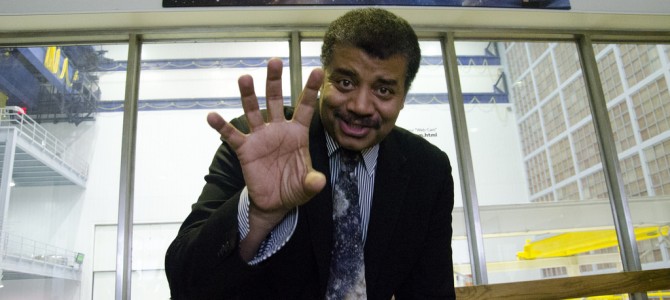
Sean Davis’s work at The Federalist documenting Neil deGrasse Tyson’s tendency to make up quotes and examples to fit his narrative has gotten some notice in an article at The Daily Beast. While the article itself is fair and nicely balanced, the subtitle the editors gave it, which speculates that criticism of Tyson might be “just anti-intellectualism run amok” is everything that’s wrong with the debate over science in the political realm.
It’s got to be a pretty sweet gig to be elevated as the personal embodiment of science and the intellect, so that anyone who questions you is presumed to be against these things.
Which is strange, because I just came across a YouTube clip of someone bashing science—and that someone is Neil deGrasse Tyson.
The clip is from a convention of “skeptics”—those of the Richard Dawkins “New Atheist” persuasion—and Tyson is trying to take on claims about medical “miracles.” He’s trying, and he fails. Badly. Here’s is what he says:
Here’s what happens. Someone is diagnosed—I’m making up a very common example, for the purposes of this explanation—somebody’s diagnosed with terminal cancer. The doctor says, “You got six months to live.” You say, “You mind if I get a second opinion.” “Of course, go ahead.” Go to a second doctor, you’ve got five months to live. Go to a third doctor, seven months to live. So basically, you’re going to be dead in six months, plus or minus, OK? What happens? You’re alive a year later. OK. You’re alive two years later. Three years later, the cancer’s in remission. Five years later, it’s gone from your body. You happen to have been a religious person, and over that time you were praying, people were praying for you. Here’s what’s astonishing. It’s that, if you are that person, you are more likely to believe that God cured you, this invisible force, creator of the universe, cured you—than that you had three idiot doctors diagnose you. I am astonished by this fact. The American Medical Association—is that what they’re called, the AMA?—has got to be the most powerful association in the world, because no one questions those diagnoses. They’ll credit whatever else was going on because they were sure they were going to die. But I can tell you this, I taught physics to pre-med students who became doctors. Not all of them were smart, I assure you. Not only that, they’re all trained in the same system, so three separate doctors that all went through the same system of medical schools—that’s not actually three different opinions. It’s the same opinion, just nuanced by what the person had for breakfast that morning…. So I’m just impressed that it’s impossible for people to think that they just had idiot doctors diagnose them, or that it was a diagnostic failure.
I know very well the point Tyson starts out trying to make, because I’ve made it before. It’s the idea that you cannot claim that “prayer works” or that God performs miracles by only looking at the rare and fortuitous cases in which someone unexpectedly survives, while ignoring all of the times that someone prays for a cure and still dies.
This is not quite as devastating an argument as Tyson thinks it is, because it only answers a relatively crude, popular notion of religion. But it’s valid as far as it goes.
Yet that’s not the point that Tyson ends up making. Instead, he somehow bungles it into an argument that doctors is stoopid because they must have gotten the diagnosis wrong.
Notice that Tyson does this without even an elementary attempt to know anything about medicine. Sure, this is a fictional example concocted on the fly (which is generally a bad practice), but it shows an appallingly shallow grasp of how physicians work. I came across this link by way of a Facebook post from a guy who appears to be a med-school student, and I can’t beat his explanation.
When a doctor gives you a diagnosis that you have cancer and you are going to die in X amount of time, what the doctor is doing is giving you an average time of death with an amount of certainty given by the 95th or 99th percent confidence intervals of the time of death since diagnosis for people who were in your same situation. As with any bell-curve distribution there’s bound to be outliers. That’s just how a bell-curve works. If you manage to outlive that, it doesn’t mean anything magical happened, but contrary to what Tyson suggests, it doesn’t mean the doctor who made this prediction is stupid either, it just means a bell-curve works the way a bell-curve works. One would think this is something Tyson would know a thing or two about.
Instead, Tyson paints himself into a corner where the only alternatives are: either God performs miracles, and doctors are stupid.
Notice that denigrating the intelligence of physicians is not just an incidental outcome of Tyson’s argument. He goes on about it at length and solicits an anecdote from a member of the audience about how many pre-med students have failed his physics class. So the point isn’t just that doctors are stupid. The point is that doctors aren’t anywhere near as smart as us physicists.
You may notice this as something of a constant when Tyson makes up an example: it’s always about how he and his audience are so much smarter than everyone else. Even if that means that he has to be “pro-science” for physicists, while regarding physicians as bumblers who repeat an unexamined consensus, leavened only by their own subjective feelings.
How is it that Tyson got himself into this intellectual mess? Here’s a clue: Tyson expressing a similar contempt for the discipline of philosophy. (Hat tip to Stuart Hayashi.) You really have to check this out to believe it: Tyson agrees with an interviewer that philosophers engage in “a little too much question asking” and ridicules them as people who “can’t even cross the street because you are distracted by what you are sure are deep questions you’ve asked yourself.”
It’s almost as if Tyson thinks physicists are the cool kids of academia, who like to make fun of those four-eyed nerds in the philosophy department.
Now, I’ve studied philosophy extensively (it was my major in college), and there is an awful lot of useless lip-flapping in the field, so I understand why scientists—who are used to crisper, more reality-oriented intellectual standards—are often turned off. But there is a big difference between saying that some philosophers and philosophies are useless, versus saying that the discipline as such is useless.
And the irony, of course, is that Tyson could have really found some use for it, because a little training in philosophy might have prevented him from making such a hash of that argument about miracles.
Those of us who do care deeply about science and about big ideas should care about it enough not to establish as some kind of authority figure a big phony who, it turns out, cares a good deal less about either of these things.
Follow Robert on Twitter.








